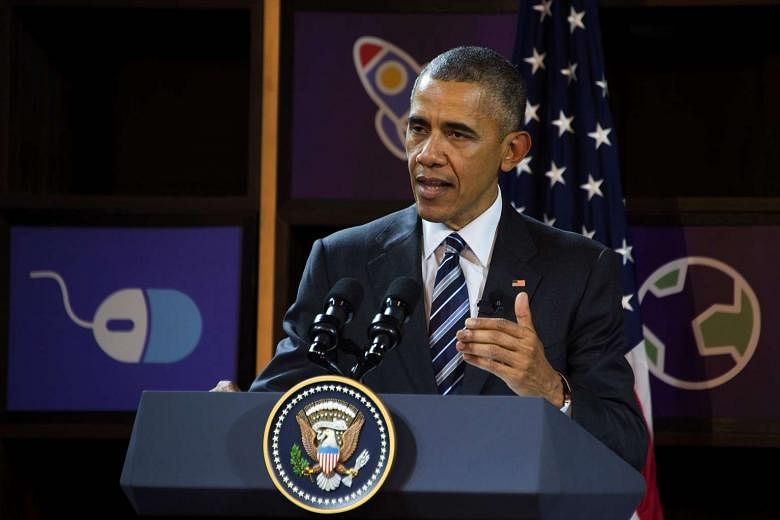United States President Barack Obama has called for territorial disputes in the South China Sea to be resolved peacefully and urged big nations against bullying smaller ones.
He made the remarks in a wide-ranging speech to an audience that included Vietnamese leaders and many young people at the National Convention Centre in Hanoi yesterday.
Tensions have risen in the South China Sea, with China laying claim to most of it and embroiled in disputes with neighbours, notably the Philippines and Vietnam, which have overlapping claims. China's massive land reclamation and construction of facilities on disputed reefs in the sea have further alarmed countries in the region.
"Big nations should not bully smaller ones. Disputes should be resolved peacefully," Mr Obama said to applause from the audience on the second day of his three-day visit. He also said regional institutions like Asean and the East Asia Summit should continue to be strengthened.
While the US is not a claimant in any of the disputes, Mr Obama said it will "stand with partners in upholding core principles like freedom of navigation and overflight, and lawful commerce that is not impeded, and peaceful resolution of disputes through legal means in accordance with international law".
Though Mr Obama did not refer to China by name, Foreign Ministry spokesman Hua Chunying later rebuffed his veiled criticisms, saying sincerity and determination mattered more than the size of a country in resolving disputes.
Ms Hua said China had settled 12 of 14 land boundary disputes with neighbours, five of whom were smaller than the Philippines in land mass and 10 smaller in population size. "A country's size is not the crux of the matter. The key lies in whether the relevant parties have the sincerity and determination to resolve the dispute through mutual hard work and negotiations," she told reporters at a regular briefing.
Mr Obama was speaking a day after the US lifted a decades-old ban on weapons sales to its once bitter enemy, Vietnam. The US and Vietnam now have a broad and vigorous trade relationship, and there is wide support in Vietnam for a closer relationship with the US.
The lifting of the arms sales ban is, however, seen as a response to China's growing footprint and clout in the disputed maritime area.
Chinese state media yesterday slammed the US move as a bid to contain China. The Global Times tabloid accused the US of "taking advantage of Vietnam to stir up more troubles in the South China Sea".
In recent months, Beijing has been riled by US warships sailing in international waters very close to Chinese-held islands in the South China Sea, activities China calls provocative. Last week, Chinese fighter jets buzzed a US reconnaissance plane over the South China Sea.
Yesterday, Mr Obama reiterated that the US would continue to "fly, sail and operate" in international waters and supported all countries doing the same. In his speech, he also made a strong pitch for the Trans-Pacific Partnership, the ambitious US-led trade pact that, he said, would help Vietnam "unleash the full potential of your economy".
And turning to the prickly issue of Vietnam's human rights record, he called for more freedoms.
"When there's freedom of expression and freedom of speech, when people are able to access the Internet and the social media without restriction… that's how new ideas happen, that's how a Facebook starts," he said.
Mr Obama later flew to Ho Chi Minh City, formerly Saigon, where he met Vietnamese entrepreneurs.
After wrapping up his visit today, he will head for Japan to attend a Group of Seven summit starting tomorrow.
• Additional reporting by Kor Kian Beng in Beijing

